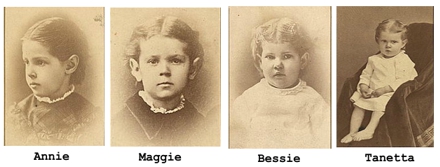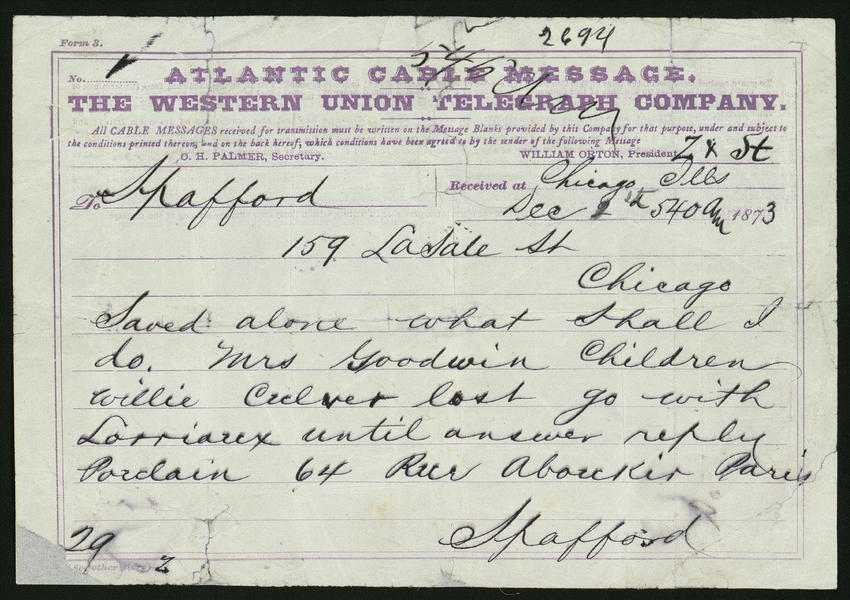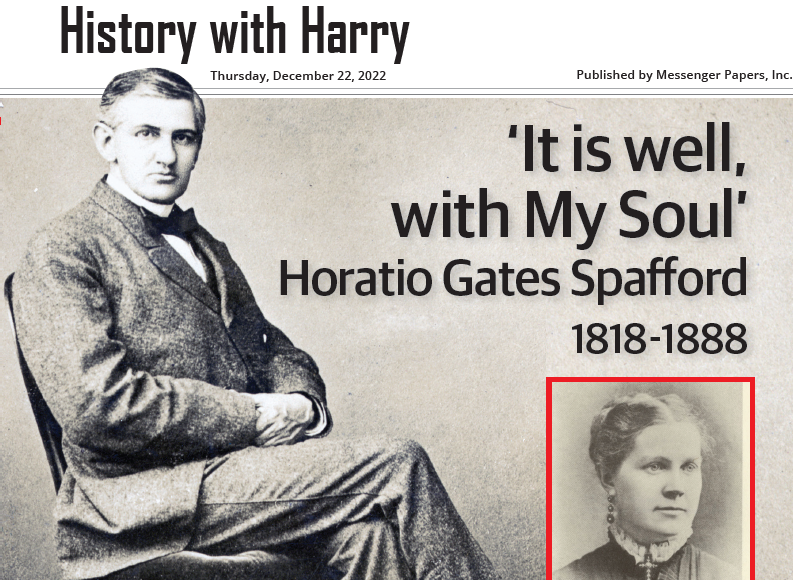Horatio Gates Spafford was born in Troy, New York in 1818.
Spafford married Anna Larsen from Norway, in Chicago in 1861. Horatio would become a very successful Chicago lawyer and by 1870 had invested heavily into local Chicago real estate. At this point, the Spafford’s had an awful lot to be thankful for.
Spafford was doing very well with his profession and investments. They enjoyed a successful marriage that included one son, three daughters and one on the way. The Spafford’s were also financial supporters and friends of evangelist Dwight L. Moody. Life was pretty good.
It was about this time in 1870 that difficulties befell the Spafford’s. First, the loss of their 4-year-old son Horatio Jr. to scarlet fever. The following October, the Great Fire of Chicago devastated much of the city. All of the Spafford’s real estate investments were completely destroyed. There was nothing left but ash.
Horatio and Anna continued to move on with life. They now had four daughters: Annie, Maggie, Bessie and Tanetth. About two years later, they decided to take a family trip to Europe and catch Moody, who was preaching in London. Just prior to leaving on the trip, business demands prevented Horatio from making the trip at that time and stayed back.
Anna and the girls boarded the cross-Atlantic steamship named Ville du Havre. On November 22, 1873, while crossing to England, the ship was struck by a steel sailing vessel, killing 226. During the sudden disaster, Anna lost hold of all four girls. The ship sank quickly in just 12 minutes. All four girls died.
Anna was thrown from the vessel and into the waters, only to be found floating on a wooden plank from the ship. Once rescued and brought safely to Wales, Anna sent back an urgent telegram to Horatio that stated only several words, “saved alone, what shall I do.”
Horatio would make immediate plans to sail and join Anna in Wales. The ship’s Captain and staff were fully aware of the past disaster and Spafford’s difficult time.
As the ship approached the site of the sinking of the Ville du Havre, the Captain offered to pinpoint the area to Horatio. Spafford would instead return to his cabin as the ship crossed the site of the disastrous sinking.
He had a booming career, investments, five kids and a great marriage. But now he found himself racing to face his grief-stricken spouse, who’s trying to deal with the reality of losing four children. Regardless of his strong faith, he must have been at an extreme low in his life.

However, Horatio, like his wife Anna, understood their daughters weren’t three miles down, but were many miles up in heaven sitting with the Lord.
While in the cabin and feeling inspired, Horatio Spafford picked up a pen and paper and began to write. Incredibly, he wrote what would become a timeless hymn.
It’s amazing that such encouraging words were drawn from someone experiencing such unimaginable sorrow. Considering what is happening, his writings reveal his fixed faith all the more. Not unlike Job of the Old Testament, Spafford placed his trust in God equally during the good times of prosperity and the loss of all in the bad.
Horatio Spafford was a devout Christian who clearly absorbed the scriptures. But faith, no matter how great, does not spare us from adversity.
A few years after the sinking and reuniting with his wife Anna, the Spafford’s would have three more children: Horatio, born in 1877, named after his father and brother who had passed, Bertha, born in 1878, and Grace born in 1881. Sadly, once again tragedy would strike. Horatio would die on February 11, 1880 at age 3 of scarlet fever.
In 1881, the Spafford’s would move to Jerusalem to do philanthropic work. Anna wrote in a letter that she was saved for a purpose. In Jerusalem, they served the needy, helped the poor, cared for the sick and helped homeless kids, revealing her love for the Lord.
Horatio Gates Spafford would die on October 16, 1888 of malaria in Jerusalem. Anna continued their work in Jerusalem until her death in 1923. Horatio knew something about life and unexpected hardships. And it goes to show that God will strengthen us to overcome troubles even in the darkest times of our Earthly years.
Storms will always be faced, and sometimes tragedies like the Spafford’s. But with unmovable faith in a loving God and with committed trust in His divine help, we can all confidently say, “It is well, it is well with my soul.”

“It Is Well with My Soul”
When peace, like a river, attendeth my way,
When sorrows, like a sea billows roll;
Whatever my lot, Thou hast taught me to say,
It is well, it is well with my soul.
Tho’ Satan should buffet, tho’ trials should come,
Let this blest assurance control,
That Christ hath regarded my helpless estate,
And hath shed His own blood for my soul.
My sin- oh, the bliss of this glorious thought-
My sin- not in part but in whole,
Is nailed to His cross and I bear it no more,
Praise the Lord, praise the Lord, oh, my soul.
And Lord, haste the day when the faith shall be sight,
The clouds be rolled back as a scroll,
The triumph shall resound, and the Lord shall descend,
“Even so”- it is well with my soul.





